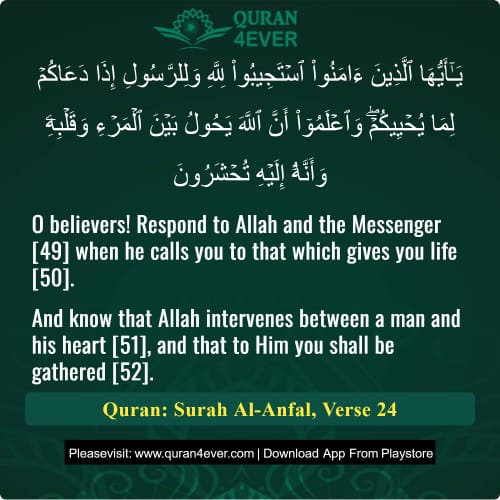
Transliteration:( Yaaa aiyuhal lazeena aamanus tajeeboo lillaahi wa lir Rasooli izaa da'aakum limaa yuhyeekum wa'lamooo annal laaha yahoolu bainal mar'i wa qalbihee wa anahooo ilaihi tuhsharoon )
"O believers! Respond to Allah and the Messenger [49] when he calls you to that which gives you life [50]. And know that Allah intervenes between a man and his heart [51], and that to Him you shall be gathered [52]."
This verse affirms that the call of the Prophet ﷺ is the call of Allah, since Allah speaks through His Messenger. A believer must respond instantly, even in the midst of Salaah, if commanded. Such obedience does not nullify the prayer; rather, it honors the status of Prophethood.
The Prophet ﷺ calls towards what revives the soul—whether it be Qur’an, Hadith, Iman, or Jihad. Though both Qur’an and Hadith are expressed through the same tongue, their divine and prophetic sources differ, and both must be followed equally. The singular form of “calls” signifies the unified authority of Prophethood.
Allah can intervene between a person and his heart, changing intentions or preventing actions. This is a reminder to respond promptly to divine guidance, since delaying may result in a change of heart beyond one's control.
Since all will eventually return to Allah, one must not delay obedience. Whether by sudden death or interrupted intentions, delays are risky. The verse urges immediate response to Prophetic guidance, which leads to eternal success.
24. O you who believe! Answer Allah and (His) Messenger when he (the Messenger) calls you to that which will give you life, and know that Allah comes between a person and his heart. And verily to Him you shall (all) be gathered.
Al-Bukhari said,
“(Answer), obey,
(that which will give you life) that which will make your affairs good.” Al-Bukhari went on to narrate that Abu Sa`id bin Al-Mu`alla said, “I was praying when the Prophet passed by and called me, but I did not answer him until I finished the prayer. He said,
(What prevented you from answering me Has not Allah said:
(O you who believe! Answer Allah and (His) Messenger when he calls you to that which will give you life)’ He then said:
(I will teach you the greatest Suah in the Qur’an before I leave.) When he was about to leave, I mentioned what he said to me. He said,
(All the praises and thanks are to Allah, the Lord of all that exists…) ﴿1:1-6﴾.
(Surely, it is the seven oft-repeated verses.)”’ Muhammad bin Ishaq narrated that Muhammad bin Ja`far bin Az-Zubayr said that `Urwah bin Az-Zubayr explained this Ayah,
(O you who believe! Answer Allah and (His) Messenger when he calls you to that which will give you life,) “Answer when called to war (Jihad) with which Allah gives you might after meekness, and strength after weakness, and shields you from the enemy who oppressed you.”
Allah said,
(and know that Allah comes in between a person and his heart.)
Ibn `Abbas commented, “Allah prevents the believer from disbelief and the disbeliever from faith.” Al-Hakim recorded this in his Mustadrak and said, “It is Sahih and they did not record it.” . Similar was said by Mujahid, Sa`id, `Ikrimah, Ad-Dahhak, Abu Salih `Atiyyah, Muqatil bin Hayyan and As-Suddi. In another report from Mujahid, he commented;
(…comes in between a person and his heart.) “Leaves him without comprehension,” As-Suddi said, “Prevents one self from his own heart, so he will neither believe nor disbelieve except by His leave.” There are several Hadiths that conform with the meaning of this Ayah. For instance, Imam Ahmad recorded that Anas bin Malik said, “The Prophet used to often say these words,
(O You Who changes the hearts, make my heart firm on Your religion.) We said, `O Allah’s Messenger! We believed in you and in what you brought us. Are you afraid for us’ He said,
(Yes, for the hearts are between two of Allah’s Fingers, He changes them (as He wills).)”
This is the same narration recorded by At-Tirmidhi in the Book of Qadar in his Jami’ ﴿Sunan﴾, and he said, “Hasan.” Imam Ahmad recorded that An-Nawwas bin Sam`an Al-Kilabi said that he heard the Prophet saying,
(Every heart is between two of the Fingers of the Most Beneficent (Allah), Lord of all that exists, if He wills, He makes it straight, and if He wills, He makes it stray.)
And he said:
(O You Who changes the hearts! keep my heart firm on Your religion) And he would say;
(The Balance is in the Hand of Ar-Rahman, He raises and lowers it.)
This was also recorded by An-Nasai and Ibn Majah.
(8:24) Believers! Respond to Allah, and respond to the Messenger when he calls you to that which gives you life. Know well that Allah stands between a man and his heart, and it is to Him that all of you shall be mustered.[19]
19. The most effective means of preventing man from failing prey to hypocrisy is to implant two ideas in his mind. First, that he will have to face the reckoning and judgement of God Who knows what is in the deep recesses of his heart. Even man’s intentions and desires, the purposes which he seeks to achieve, the ideas that he seeks to keep hidden in his heart, are all well known to God. Second, that ultimately every man will be mustered to God; that He is so powerful that none can escape His judgement. The deeper the roots of these convictions. the further is man removed from hypocrisy. Hence, while admonishing Muslims against hypocrisy, the Qur’an frequently resorts to emphasizing these two articles oi belief.

For a faster and smoother experience,
install our mobile app now.
Related Ayat(Verses)/Topics